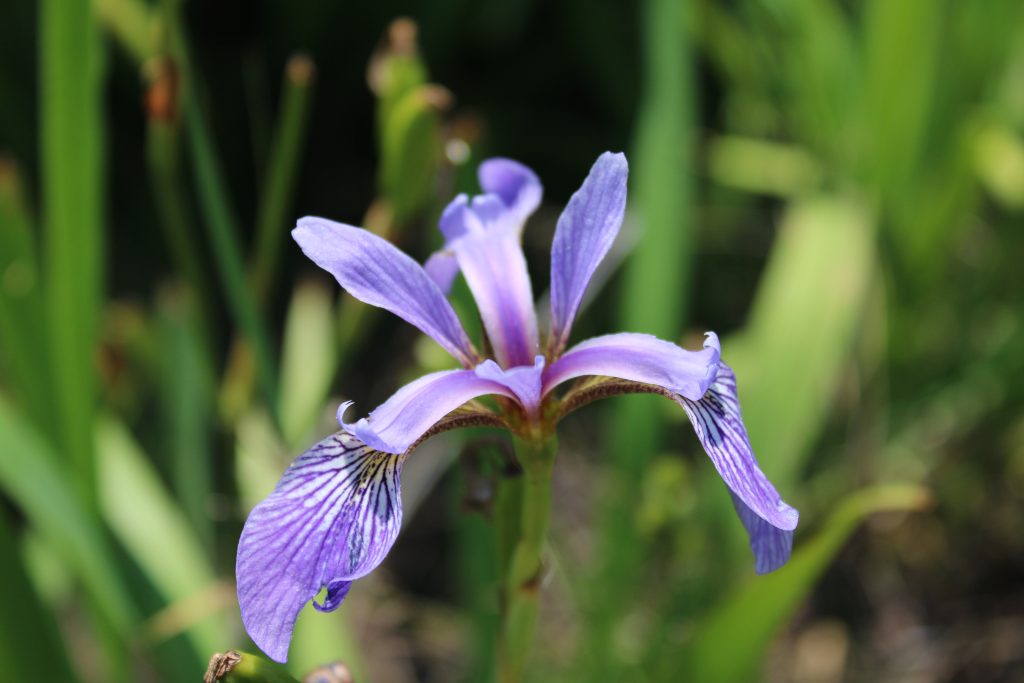

Gloves ready and trowels in hand, the Evesham Green Team and the Garden Club of Marlton held their first self-guided garden tour on June 5 in the hope of inspiring people to begin their own planting journeys.
“For everybody’s well-being, we have to restore the ecosystem around us,” said Environmental Commissioner and Green Team member Janet Rolnick. “Gardening is kind of where it all starts.”
Members of the team opened their homes for four hours so guests could walk through and see a variety of garden beds. Tour conductors reminded visitors of the importance of proper planting, native plants, pollinator gardens and invasive species.
Rolnick, who lives on 11 acres of land in Marlton, was one out of the seven homes featured on the tour. Her home of 42 years features a range of native plants, including Iris, Sweet William, Plumbago and Lilac.
Native plant species have co-evolved with insects and other animals from the New Jersey region and support a diverse and balanced food web essential to sustain an ecosystem.
“Initially it was going to be a pollinator garden, and then I started attending webinars,” Rolnick explained. “The good thing about COVID is, I got to see and hear through the webinars things I probably wouldn’t. The more I listened, I wanted to reintroduce as many plants as I could back into my property.”
A pollinator garden can come from turf grass that offers additional support for a specific pollinator insect, like native bees and butterflies. Rolnick planted bee balm and milkweeds — the host of the monarch butterfly — to attract these species to the garden.
Rolnick’s green thumb took time to develop. Once the art teacher retired from Lenape High School after 27 years, she became friends with Kathy Simon, who works at the Cherry Grove Farm in Lawrenceville. The friendship meant more than Simon educating Rolinck about native plants, but a partnership where Simon spent time in Rolnick’s yard to help develop diversity. Her efforts included implementation of a rain garden and construction of a dead hedge, a pile of branches and twigs arranged to form a barrier.
“We took out so much debris; we went down the tree line and took out a tree of heaven, which houses the lanternfly,” Simon explained on the June 5 tour. “We built this dead hedge as a way to discourage the deer, but it also creates a bird habitat. It’s wide enough that the birds go inside and hop around.”
Chuck and Joyce Walker took a 20-week environmental class at Rutgers-Camden and implemented what they learned into their garden.
“Everything we did during quarantine was to implement the things we learned to have a sustainable yard and a yard for habitat,” Joyce Walker said during the tour. “We call it planting for purpose, so we have a vegetable garden, composting area, our native plants and our pollinator plants.”
One of the native plants featured in the Walkers’ garden is Agastache Foeniculum, a lavender colored plant that is a part of the mint family. Also known as anise hyssop, it is best grown in full sun to part shade, and can tolerate almost any soil, including dry soils. The seed cost can range from $5 to $10.
The green team and the garden club both offer opportunities for volunteers to get involved in community gardening. One example is the wildflower patch at Evesboro Downs Park that was also featured on the tour. It was formed in 2015, and after getting rid of its invasive plants, the green team worked with the township and the Environmental Commission to plant black-eyed Susans, Coreopsis and Irises.
“Since we have these natives, we’ve occasionally had a Gray tree frog, and we do have Monarch caterpillars, butterflies and their eggs, dragonflies and different moths,” said Environmental Commissioner and Green Team member Ila Vassallo at the tour.
Vassallo hopes the community will come to know the importance of getting rid of invasive species in New Jersey like Norway Maple, Japanese Barberry, Asian Bittersweet and English Ivy, then replacing them with natives so the species can adapt and benefit from the change.
“The goal is to plant as close to what belongs on your property, and as close to a plant that actually came from nearby,” Rolnick noted. “If you can buy a plant that was raised in New Jersey, that is not a cultivar and is a straight plant, it’s much better off.”
The Marlton garden tour was conducted in partnership with Catalpa Gardening, the Native Plant Society of New Jersey, New Jersey Audubon, Rutgers Environmental Stewards Alumni and the Xerces Society.
For more information on how to get involved with the Evesham Green Team, visit https://sites.google.com/view/eveshamgreenteam/home.









